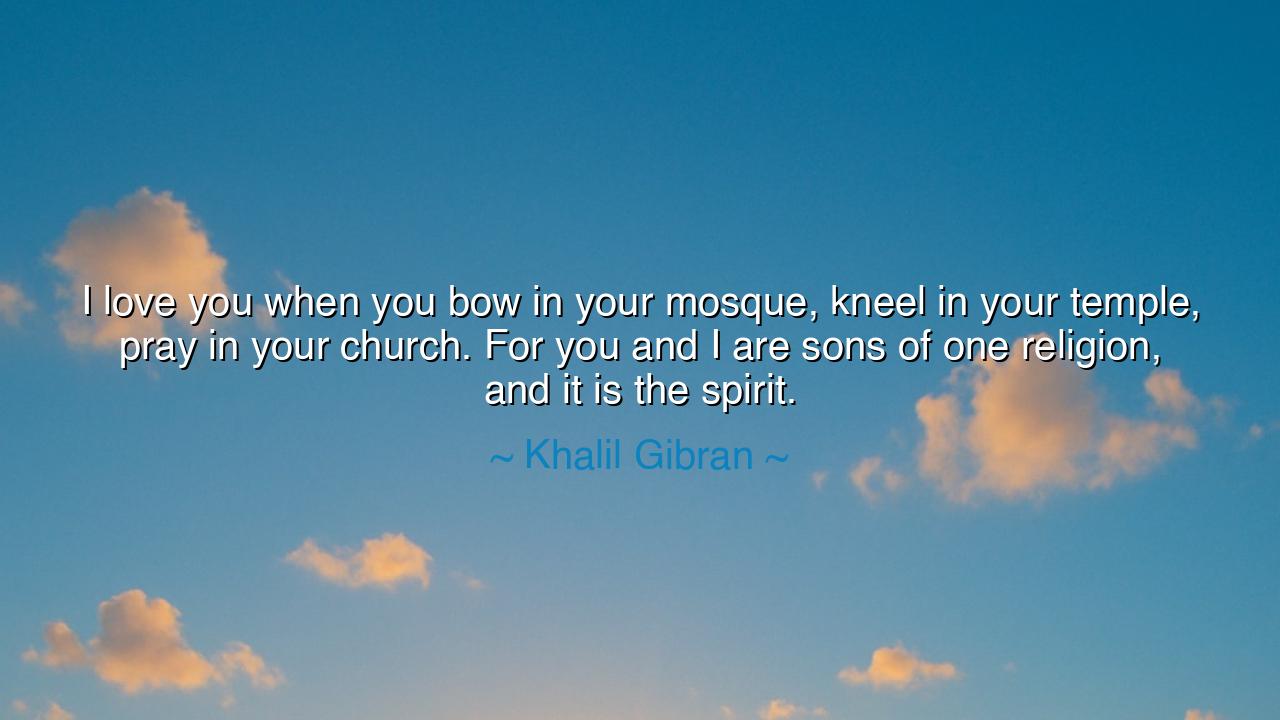
I love you when you bow in your mosque, kneel in your temple
I love you when you bow in your mosque, kneel in your temple, pray in your church. For you and I are sons of one religion, and it is the spirit.






“I love you when you bow in your mosque, kneel in your temple, pray in your church. For you and I are sons of one religion, and it is the spirit.” — Thus spoke Khalil Gibran, the mystic poet of Lebanon, whose words flow like sacred water between East and West. In this immortal saying, Gibran tears away the veils that divide humankind and reveals a truth that burns with divine simplicity: that all faiths, all paths, all prayers — when offered in sincerity — rise to the same heaven. He proclaims that true religion is not of form, but of essence; not of stone, but of soul. Beneath the symbols and rituals, there beats a single eternal heart — the spirit, which unites all who love truth, compassion, and beauty.
The origin of this saying lies in Gibran’s lifelong longing for unity. Born in a land where the call to prayer mingled with church bells and temple chants, he saw both the harmony and the strife of human faith. Exiled as a child, raised among cultures and tongues, Gibran came to see that the divisions of religion were man-made, while the divine was infinite and indivisible. His masterpiece, The Prophet, speaks in the language of the eternal, transcending creed. His soul, touched by both Christianity and Islam, learned to see the sacred not in one form of worship, but in all. From this vision was born his declaration: that the spirit is the true religion, and that every act of sincere devotion, no matter its shape, is a gesture of love toward the same eternal source.
To bow, to kneel, to pray — these are the languages of reverence. Yet Gibran reminds us that they are but different accents of the same longing. The man who kneels before the cross, the woman who bows toward Mecca, the sage who sits in silent meditation — each is seeking the same peace, the same truth, the same communion with the divine. The tragedy of humanity, he laments, is that men mistake the vessel for the water. They quarrel over symbols while forgetting the living spirit they are meant to serve. In his vision, God is not the property of any temple; He is the breath of life within every being who loves, forgives, and seeks understanding.
This truth has echoed through the hearts of the great souls of history. Mahatma Gandhi, though a Hindu, often prayed with Christians, Muslims, and Buddhists alike. He believed that “the paths are many, but the goal is one.” His reverence for all faiths was not compromise, but comprehension — a living echo of Gibran’s vision. When Gandhi was asked which religion he followed, he replied, “I am a Hindu, a Muslim, a Christian, and a Jew.” In this humility of spirit, we see the same divine recognition that Gibran spoke of: that we are sons of one religion — the spirit. The spirit that seeks truth in all things and love in all hearts.
And yet, this wisdom, though ancient, remains ever needed. For even now, men divide themselves by creed, raise walls between names of God, and fight over the garments of faith while forgetting the body of love they once clothed. Gibran’s words come as both a balm and a challenge. They ask us to look beyond the outward forms — beyond mosque, temple, and church — and see the light that shines in all. They call us to recognize that every faith, in its purest form, is a different melody in the same great song of creation.
But make no mistake — this unity is not the denial of difference. It is the celebration of diversity within harmony. Just as rivers differ in course but meet in the sea, so too do religions differ in practice but converge in purpose. Gibran’s love for all worshipers is not born of indifference, but of insight — the understanding that love itself is the highest act of worship. For what greater religion can there be than compassion? What holier temple than the human heart that beats for others?
Therefore, beloved listener, let this teaching sink deep into your spirit: reverence lies not in where you pray, but in how you live. Let your heart be your church, your mind your temple, your deeds your prayer. When you see your neighbor kneel in another way, do not despise him — love him, for he is walking toward the same light by a different road. Honor the diversity of devotion, for it reveals the vastness of the divine. Be slow to judge and quick to love, for love is the language that all heavens understand.
This, then, is the eternal wisdom of Khalil Gibran: that we are all children of one spirit, seekers of one truth, worshipers at the altar of love. Religion, stripped of love, becomes law without life; but when it flows from the spirit, it becomes music, light, and freedom. So bow if you will, kneel if you must, pray as your heart guides — but remember that the holiest act of all is kindness. For the Kingdom of Heaven is not found in temples or texts, but in the soul that knows that to love another is to love God Himself.






AAdministratorAdministrator
Welcome, honored guests. Please leave a comment, we will respond soon